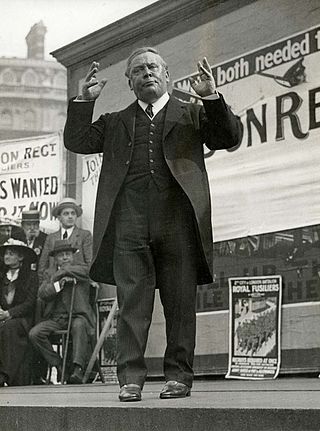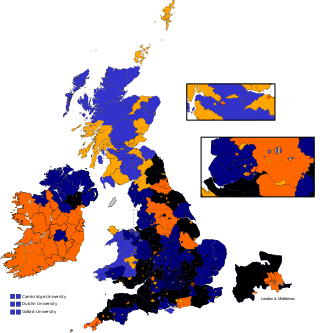Related Research Articles
The Progressive Party of Canada, formally the National Progressive Party, was a federal-level political party in Canada in the 1920s until 1930. It was linked with the provincial United Farmers parties in several provinces, and it spawned the Progressive Party of Saskatchewan, and the Progressive Party of Manitoba, which formed the government of that province. The Progressive Party was part of the farmers' political movement that included federal and provincial Progressive and United Farmers' parties.

Virginia Hilda Brunette Maxwell Bottomley, Baroness Bottomley of Nettlestone, is a British Conservative Party politician and headhunter. She was a Member of Parliament (MP) in the House of Commons from 1984 to 2005. She became a member of the House of Lords in 2005.

Sir Peter James Bottomley is a British Conservative Party politician who has served as a Member of Parliament (MP) since 1975, and who currently represents Worthing West. First elected at a by-election in the former constituency of Woolwich West, he served as its MP until its abolition at the 1983 general election, and then for the Eltham constituency which replaced it, until 1997. He moved to his current constituency at the 1997 general election.

Horatio William Bottomley was an English financier, journalist, editor, newspaper proprietor, swindler, and Member of Parliament. He is best known for his editorship of the popular magazine John Bull, and for his nationalistic oratory during the First World War. His career came to a sudden end when, in 1922, he was convicted of fraud and sentenced to seven years' imprisonment.

The Irish Unionist Alliance (IUA), also known as the Irish Unionist Party, Irish Unionists or simply the Unionists, was a unionist political party founded in Ireland in 1891 from a merger of the Irish Conservative Party and the Irish Loyal and Patriotic Union to oppose plans for home rule for Ireland within the United Kingdom of Great Britain and Ireland. The party was led for much of its existence by Colonel Edward James Saunderson and later by William St John Brodrick, Earl of Midleton. In total, eighty-six members of the House of Lords affiliated themselves with the Irish Unionist Alliance, although its broader membership among Irish voters was relatively small.
The National Party was a short-lived British political party created in August 1917 as a right-wing split from the Conservative Party.
The Unionist Party was a pre-apartheid South African political party, which contested elections to the Union of South Africa parliament from the 1910 South African general election until its merger into the South African Party just before the 1921 South African general election.
The Anti-Waste League was a political party in the United Kingdom, founded in 1921 by the newspaper proprietor Lord Rothermere.

Sir Richard Layton Butler KCMG was the 31st Premier of South Australia, serving two disjunct terms in office: from 1927 to 1930, and again from 1933 to 1938.

Westmorland was a constituency covering the county of Westmorland in the North of England, which returned Members of Parliament to the House of Commons of the Parliament of the United Kingdom.
Major the Hon. Christopher William Lowther was a British Conservative Party politician, the elder son of James Lowther, 1st Viscount Ullswater.

The 1920 Stockport by-election was a parliamentary by-election held on 27 March 1920 for the constituency of Stockport, in Cheshire.
The 1921 Penrith and Cockermouth by-election was a parliamentary by-election held for the British House of Commons constituency of Penrith and Cockermouth in Cumberland on 13 May 1921.
Charles Frederick Palmer was a British journalist and newspaper editor, closely associated at the end of his career with the politician and business fraudster Horatio Bottomley. Palmer sat briefly in the House of Commons after winning a by-election as an Independent in February 1920.
The Shrewsbury by-election was a Parliamentary by-election held on 22 April 1913. The constituency returned one Member of Parliament (MP) to the House of Commons of the United Kingdom, elected by the first past the post voting system.
Sir Gilfrid Lawson, 9th Baronet, was one of the Lawson Baronets.

The Hackney South by-election was a Parliamentary by-election held on 24 May 1912. The constituency returned one Member of Parliament (MP) to the House of Commons of the United Kingdom, elected by the first past the post voting system.

Albert Arthur "Alf" Purcell was a British trade unionist and Labour Party politician. He was a founding member of the Communist Party of Great Britain and later President of the International Federation of Trade Unions from 1924 to 1928 and sat in the House of Commons during two separate periods between 1923 and 1929.
1920 The Wrekin by-election was held on 7 February 1920. The by-election was held due to the death of the incumbent Coalition Liberal MP, Sir Charles Henry Bt. It was won by the Independent Conservative candidate Charles Palmer, who was backed by Horatio Bottomley's Independent Parliamentary Group.
References
- ↑ F. W. S. Craig, Minor Parties at British Parliamentary Elections
- David Butler and Gareth Butler, British Political Facts